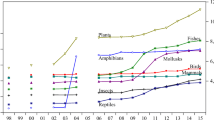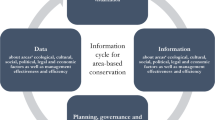Abstract
In a changing global environment, with increasing pressure on ecosystem goods and services, biodiversity conservation is likely to become increasingly important. However, with the current global financial crisis, governments are increasingly trying to stabilise economies through spending cuts aiming to reduce national deficits. Within such an economic climate, the devolution of governance through public participation is an intrinsically appealing concept. We outline a number of challenges that explain why increased participation in biodiversity management has been and may continue to be problematic. Using as a case study the local stakeholder-driven Moray Firth Seal Management Plan in Scotland, we identify four key conditions that were crucial to the successful participatory management of a biodiversity conflict: a local champion, the emergence of a crisis point, the involvement of decision-makers, and long-term financial and institutional support. Three of the four conditions point to the role of direct government involvement, highlighting the risk of devolving responsibility for biodiversity conflict management to local communities. We argue that without an informed debate, the move towards a more participatory approach could pose a danger to hard-won policy gains in relation to public participation, biodiversity conservation and conflict management.
Similar content being viewed by others
References
Beierle TC, Konisky DM (2001) What are we gaining from stakeholder involvement? Observations from environmental planning in the Great Lakes. Environ Plan C 19:515–527
Butler JRA (2005) Moray Firth Seal Management Plan - a pilot project for managing interactions between seals and salmon in Scotland. Spey District Fishery Board, Aberlour
Butler JRA, Middlemas SJ, McKelvey SA, McMyn I, Leyshon B, Walker I, Thompson PM, Boyd IL, Duck C, Armstrong JD, Graham IM, Baxter JM (2008) The Moray Firth Seal Management Plan: an adaptive framework for balancing the conservation of seals, salmon, fisheries and wildlife tourism in the UK. Aquat Conserv 18:1025–1038
Butler JRA, Middlemas SJ, Graham IM, Harris RN (2011) Perceptions and costs of seal impacts on salmon and sea trout fisheries in the Moray Firth, Scotland: implications for the adaptive co-management of special areas of conservation. Mar Policy 35:317–323
Cameron D (2010) Transcript of a speech by the Prime Minister on the Big Society, 19 July 2010. http://www.number10.gov.uk/news/speeches-and-transcripts/2010/07/big-society-speech-53572
DEFRA (2005) Securing the future: delivering UK sustainable development strategy. DEFRA, UK
Eden S (1996) Public participation in environmental policy: considering scientific, counter-scientific and non-scientific contributions. Public Underst Sci 5:183–204
European Commission (2005) Communication from the Commission to the Council, the European Parliament, the European Economic and Social Committee and the Committee of the Regions: the Commission’s contribution to the period of reflection and beyond: plan-D for democracy, dialogue and debate. COM 494 final
Graham IM, Harris RN, Matejusova I, Middlemas SJ (2011) Do ‘rogue’ seals exist? Implications for seal conservation in the UK. Anim Conserv 14:587–598
Harrison C, Burgess J (2000) Valuing nature in context: the contribution of common-good approaches. Biodivers Conserv 9:1115–1130
Huntington HP (2000) Using traditional ecological knowledge in science: methods and applications. Ecol Appl 10:1270–1274
Involve (2005) The true costs of participation. http://www.involve.org.uk/assets/Uploads/True-Costs-Full-Report2.pdf. Accessed 23 Aug 2010
McCool SF, Guthrie K (2001) Mapping the dimension of successful public participation in messy natural resource management situations. Soc Nat Resour 14:309–323
Milliennium Ecosystem Assessment (2005) Ecosystems and human well-being: a framework for assessment. Island Press, Washington
Mosse D (2001) ‘People’s knowledge’, participation and patronage: operations and representations in rural development. In: Kothari U (ed) Participation: the new tyranny?. Cooke B Zed Books, London
Mutamba E (2004) Community participation in natural resources: reality or rhetoric? Environ Monit Assess 99:105–113
Newig J, Fritsch O (2009) Environmental governance: participatory, multi-level - and effective? Environ Policy Gov 19:197–214
Owens S (2000) ‘Engaging the public’: information and deliberation in environmental policy. Environ Plan A 32:1141–1148
Parkins JR, Mitchell RE (2005) Public participation as public debate: a deliberative turn in natural resource management. Soc Nat Resour 18:529–540
Primmer E, Kyllonen S (2006) Goals for public participation implied by sustainable development, and the preparatory process of the Finnish National Forest Programme. For Policy Econ 8:838–853
Richards C, Sherlock K, Carter C (2004) Practical approaches to participation. SERP Policy Brief No.1. Macaulay Institute, Aberdeen
Steelman TA, Ascher W (1997) Public involvement methods in natural resource policy-making: advantages, disadvantages and trade-offs. Policy Sci 30:71–90
Sultana P, Abeyasekera S (2008) Effectiveness of participatory planning for community management of fisheries in Bangladesh. J Environ Manage 86:201–213
Thompson PM, Mackey B, Barton TM, Duck C, Butler JRA (2007) Assessing the potential impact of salmon fisheries management on the conservation status of harbour seals (Phoca vitulina) in north-east Scotland. Anim Cons 10:48–56
Tuler S, Webler T (1999) Voices from the forest: what participants expect of a public participation process. Soc Nat Resour 12:437–453
UNCED (1992) Agenda 21: programme for action for sustainable development. United Nations Conference on the Environment and Development, Rio de Janeiro June 1992
van den Hove S (2000) Participatory approaches to environmental policy-making: the European Commission Climate Policy Process as a case study. Ecol Econ 33:457–472
Acknowledgments
This paper was supported by NERC CEH (Project NEC04049) as part of J.C.Y’s PhD training. We thank all interviewees who took part in this research, together with Adam Vanbergen and Isla Graham for their valuable comments on the paper.
Author information
Authors and Affiliations
Corresponding author
Rights and permissions
About this article
Cite this article
Young, J.C., Butler, J.R.A., Jordan, A. et al. Less government intervention in biodiversity management: risks and opportunities. Biodivers Conserv 21, 1095–1100 (2012). https://doi.org/10.1007/s10531-012-0243-0
Received:
Accepted:
Published:
Issue Date:
DOI: https://doi.org/10.1007/s10531-012-0243-0




